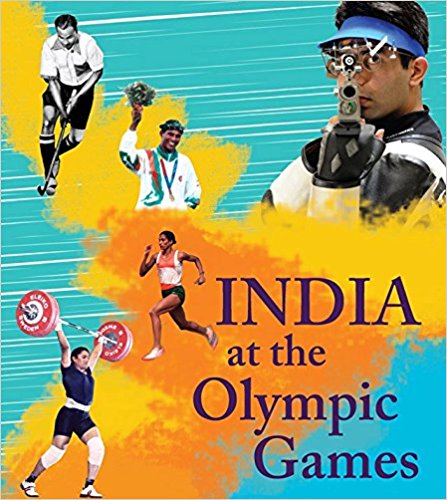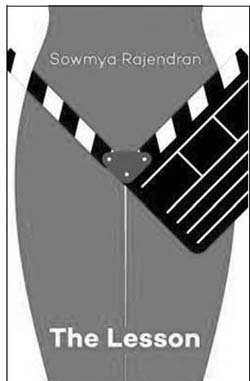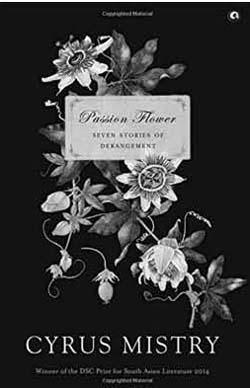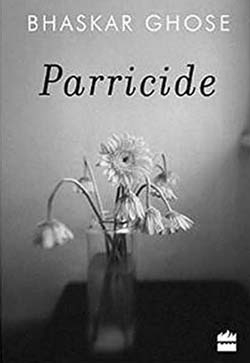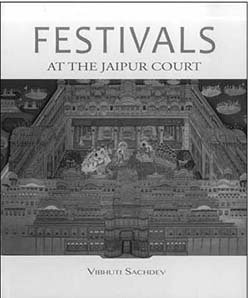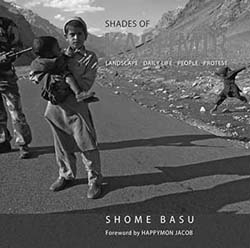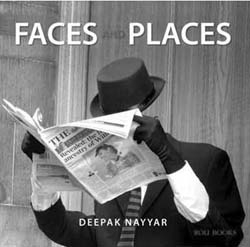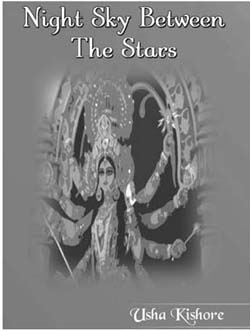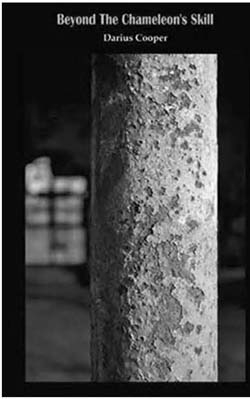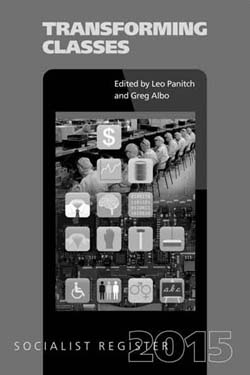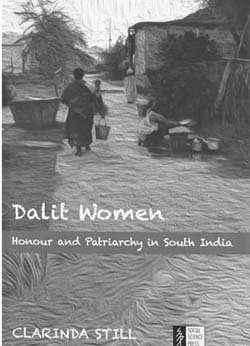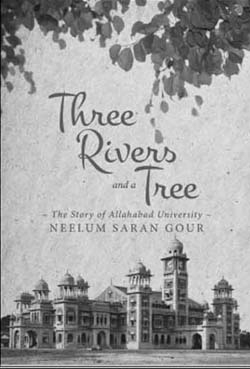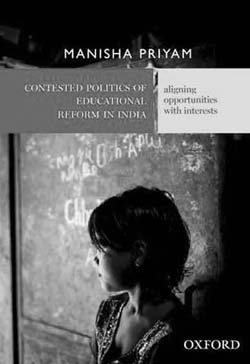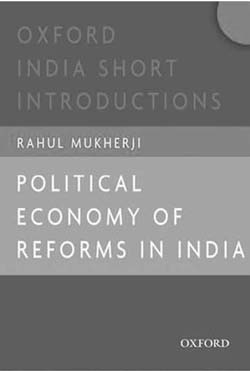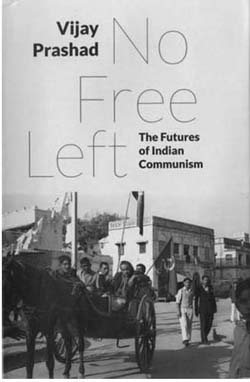Published this year of the London Olympics INDIA at the Olympic Games is a timely and informative publication. It is also fun! It begins with a letter from Abhinav Bindra, India’s first individual Olympic gold medalist, where he says: ‘I believe every child should have the chance to play’.
Archives
September 2015 . VOLUME 39, NUMBER 92015
A society dominated by Morality, as defined by the patriarchs who hope to keep the world going according to their writ. This is what The Lesson is about. The blurb describes it as ‘a dystopian satire on the violence that women live with.’ The dominant role is that of the rapist, a rather perverted ‘knight in shining armour’ who descends on recalcitrant women to teach them a lesson.
In the summer of 1992 my father took our family and the family of a visiting aunt to Ayodhya, Faizabad. While the objective for the aunt’s family was clearly sacred and devotional, to my father it remained mainly ‘journalistic’. As he said then that ‘we must see the Mosque’ for he was not very sure of its ‘future’ given the politics of hate and violence in those times fuelled by the RSS, BJP and their various sister organizations.
If any evidence were needed to establish that Cyrus Mistry is one of the finest writers in India today reading just one of his tales from his collection of short stories will be more than enough. Each of his stories is intensely perceived and documented dispassionately, leaving the reader the license to react emotionally and rationally.
2015
Towards the beginning of Anuradha Roy’s new novel, Sleeping on Jupiter, three elderly women, travelling to the temple town of Jarmuli, realize that a young co-passenger has missed the train after having disembarked at a crowded station en route. Concerned, because Nomi had seemed to be in some danger when they had last sighted her, one of the ladies reaches for the emergency chain to stop the train.
Ghost Fleet is a must read for those interested in the future of conflict. Imaginative, thoughtful, the authors have drawn together a diverse set of evolving trends in modern warfare—from ‘hybrid war’ to cutting-edge technological developments in cyber, directed energy and unmanned systems—and woven them into a scenario of great power conflict in the near future where they all interact.
Is it my need, or my wish, To learn that lock-opener That language called English? There is centuries of anger to unleash, And a journey from the dregs to niche. That roughly is the sentiment that the book in question, English in the Dalit Context, rallies around English as a tool of empowerment for the dalit community. The book, edited by Alladi Uma, Suneetha Rani and D.M. Manohar, is a collection of 14 essays that emerged out of a national seminar on ‘English in the Dalit Context’ organized by the University of Hyderabad in 2013.
2015
Parricide is Bhaskar Ghose’s second novel. His first novel The Teller of Tales was published in 2012. Parricide narrates the story of a young man’s journey from deep seated hatred for his father to his eventual forgiveness and acceptance of him. The protagonist of the story is Ravi, whose troubled relationship with his abusive father governs his life, career and subsequent relationships.
Festivals are intrinsic to communities the world over and are celebrated everywhere with joy, enthusiasm and devotion. This is even truer in India, an ancient land with an unbroken legacy of sacred rites and rituals, a strict adherence to custom and a consuming desire for communing with the Divine. Here, even the humblest home will mark the special days as best as it can.
As laid out in the introduction to All Time Favorite Books and Movies and Their Epic Journey, Patil has picked some of his favorite stories of all time from literature and cinema and presented rich behind-the-scenes trivia. To these details are added opinions which reiterate his imagination of their ‘epic’-ness.
The truth is the best picture, the best propaganda’, asserted Robert Capa, the legendary conflict photographer. So raw and realistic was his work that his memorable photograph ‘The Falling Soldier’, clicked at what appears to be the very instant that a Spanish Republican fighter took a lethal bullet hit, was the subject of long debate about whether it was genuine or contrived.
2015
This book is rife with curiosities—like this image of a smiling dog keeping company with four men, all fashioned out of stone; a Mandrake like figure poring over The Times London with his hat sitting jauntily on the blank space where his head should have been; or the voluptuous beauty of a protea neriifolia growing in a Cape Town botanical garden.
Indian myths, legends, philosophical threads and Gods and Goddesses constitute the quintessence of this collection presented by the Indian born British poet Usha Kishore. She does not present the Indian ethos as reference points, but she goes deep into these elements and combines her inherent ideas related to feminism and her native links.
Darius Cooper’s poems bear the influences of the revolutionaries in Indian poetry written in English; one can hear Nissim Ezekiel, Saleem Peeradina,
The Wall and Other Poems is Jaydeep Sarangi’s fourth book of poetry and every bit as engaging, exciting and challenging as the previous collections, From Dulong To Beas, Silent Days, A Door Somewhere?
Noted Marxist theorists Leo Panitch and Greg Albo have edited the latest annual issue of The Socialist Register (2015) and devoted it to the analysis of class on a global scale. Comprised of as many as eighteen chapters, Transforming Classes covers various manifestations of classes in different parts of the world such as India, China, Egypt, Turkey, South Africa, Chile, Brazil, the USA and the regions of Europe.
In the last two decades a number of autobiographies have been published both in English and regional languages documenting the experience of dalit-ness and the constitution of the dalit self. Some of these autobiographies are by dalit women and it forefronts the gendered experience of caste, critiquing dalit men, the dalit movement and the mainstream feminist movement..
The known academic culture of India also harbours within it another unknown culture made up of provincial universities rooted in the spirit of the area.
At the core of the spread of mass schooling in democratic nations has been a set of ideas and beliefs. It is a widely held, if not universally accepted, view that not only does schooling provide individuals with important competencies; it is an important tool of social engineering and overall progress of a nation. A democratic nation has, therefore, important stakes in educating every child for as many years as possible regardless of social origin, geographic locations and economic circumstances.
Beginning in the 1970s, sociology of education in India has been marked more by debates and theories than field work. Ethnographies of Schooling in Contemporary India is an important contribution to this context. The essays presented in the volume under review are based on the study of everyday processes in different types of schools.
Part of the Oxford Series of short introductions Political Economy of Reforms in India by Rahul Mukherji runs over 200 pages. The book’s four compact chapters addressing the major themes of economic reforms and social change in a chaotic democracy delineates both the success of India’s growth model in the post-liberalization period as well as the predicaments of poor infrastructure, inefficient public delivery system and low literacy levels that it produces.
The recent right turn in Indian politics has left the Left parties in a lurch. The 2014 Lok Sabha election electorally devastated the entire Left, particularly the Communist Party of India-Marxist. Vijay Prashad’s No Free Left: The Futures of Indian Communism examines the existential crisis faced by the Left parties in India given the formidable challenge from the Right, especially from the dizzying electoral success of the Bharatiya Janata Party in the 2014 Lok Sabha polls.

